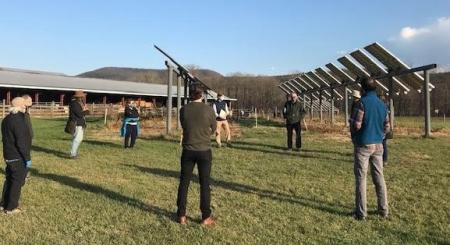The U.S. Department of Energy (DOE) Solar Energy Technology Office announced recently that a team led by Dwayne Breger at the University of Massachusetts Amherst has been selected for a three-year, $1.8 million award to study the effects of co-locating solar energy panels and agriculture operations at up to eight different farms across the Commonwealth. The work will be in partnership with other stakeholders.
Breger, who is also director of UMass Clean Energy Extension, says, “Our objective with this award is to have the opportunity to do robust research to address the dearth of data on the impact of this solar approach to agricultural productivity and farm viability. We need data on how the agriculture will perform, and how the project economics will affect individual farms and the state agricultural economy as a whole.”
He adds, “Right now, many communities don’t have the necessary experience to understand and manage the solar development that is coming, and farmers don’t have science-based facts to fully assess the opportunities that developers are proposing to them. Our project will do the research to allow us to help farmers and communities make informed decisions about the solar opportunities that are coming their way.”
Both the Massachusetts Departments of Agricultural Resources (MDAR) and Energy Resources (DOER), are keenly interested in this project, since outcomes will provide the science to inform policy development.
“The dual use of land for farming and solar energy has gotten many people excited about its potential. Now, with this new project, we’ll be able to begin developing data to quantify the agronomic and economic effects on farming to determine whether that excitement is warranted or not,” adds Jody Jellison, director of the UMass Center for Agriculture, Food and the Environment and UMass Extension.
Breger and research colleagues at UMass Extension, the UMass Cranberry Station, the campus’s Department of Resource Economics and the American Farmland Trust will study the economic and social impact of solar-agriculture co-location on farms by establishing site trials and assessing crop productivity, soil health, and micro-climatic conditions. Sites will grow a range of crops including pumpkins, strawberries, greens, winter squash, cranberries, hay, grazing, other vegetables and other small fruit.
Farm partners are in Grafton, Carver, Dighton, Plympton, Hadley, Colrain, and Charlemont. Solar developer partners BlueWave Solar, Pine Gate Renewables and Hyperion Systems are dedicating portions of their commercial dual-use solar installations at these farms for research site trials enabling a robust research scope over varied agricultural conditions. Most site trials will get underway in March 2021 in time for the first planting, Breger says.
MDAR Commissioner John Lebeaux says his agency is thrilled and thankful that DOE selected the experienced and diverse UMass team for this important land use research. He notes this study will balance important information for Massachusetts farms wishing to keep their valuable agricultural land in active, marketable production while implementing clean energy. (News Office 12/3/20, Business West 12/8/20)
